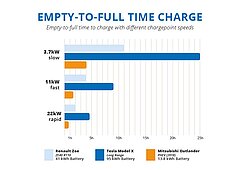How Long Does It Take to Charge an Electric Car?
Last updated:
The question of electric car charging speed is a bit more complicated than it sounds. Giving an answer to it is quite a challenge as electric vehicle charging time can vary from 30 minutes to more than 10 hours, depending on various factors.
Before we dive into the details, it is important to point out that in this article we are going to analyse the speed of transmitting power through AC chargers as they are the most common choice among EV vehicle owners. We also have a blog post about AC vs DC charging in case you want to know more about it.
Do you want to allow Integration of youtube videos?
Allows the playback of videos, that are hosted on youtube.com. By allowing this feature, you accept the privacy agreement of google.
So let’s start by talking about the various factors influencing the charging time.
5 Factors that Affect Charging Time
The image below shows 5 factors, which can make the charging time of your electric vehicle either longer or shorter.
Factor 1: Battery Size and Battery Status
EV battery size
The battery capacity of a battery electric vehicle (BEV) may vary from 5.8 kWh (Renault Twizy) to 107.8 kWh (Mercedes EQS 580 4matic). Consequently, the Mercedes car charging time is higher.
If you know the battery capacity of your car, it will be easier for you to calculate how much time you approximately need to fill in your battery.
But be aware that this is not the only thing that determines how long the charging process takes. The next thing to consider is the battery status.
EV battery status
Naturally, if the battery is half full, the electric car recharge time will be shorter than if the battery is completely discharged. If you are charging from empty, it will take longer to charge the electric vehicle than if you are topping up from 50%.
Factor 2: Max Charging Rate of EV
Let’s say your car can take a maximum of 11 kW, and you plug it into a 22 kW charging station. What happens then…?
No miracles, you can only charge a car’s battery at the maximum charge rate the car can accept. So your vehicle will only take a maximum of 11 kW, because it is its own maximum charging speed.
Factor 3: Max Charging Rate of the Charger
On the other hand, the time it takes to charge is also limited by the max charging rate of the charger you are using.
This means, you will not enjoy fast charging if your vehicle’s charging rate is higher than the one the EV charging point has. Even if your vehicle can charge 22 kW, it will only charge at 11 kW on a 11 kW charger.
So don’t forget to check the max speed of the charger before buying one. ☝
In the next section, we’ll take a look at the charging phases.
Factor 4: Charging Phases
The maximum charging speed of electric cars depends a lot on whether you have a vehicle with a single-phase, two-phase or three-phase on-board charger. Here is an example based on our go-e Chargers 11 kW and 22 kW:
| go-e Charger 11kW | go-e Charger 22kW | Remark | |
|---|---|---|---|
| Single-phase charging car | 1,4 kW - 3,7 kW | 1,4 kW - 7,4 kW | Country-specific limitations need to be observed |
| Two-phase charging car | 2,8 kW - 7,4 kW | 2,8 kW - 14,8 kW | Two-phase connection of charger not possible |
| Three-phase charging car | 4,2 kW - 11 kW | 4,2 kW - 22 kW | go-eCharger switches through the power that is available at the connection |
Some cars can only be powered via one or two phases. This means you still can use a three-phase EV charger for this car, but it won’t make any difference regarding charging time of your electric vehicle.
Let’s have a look at the examples of car models and the charging phases they support.
Three-phase charging: Audi e-tron, Renault Zoe, Tesla Model X, BMW i3
Two-phase charging: VW e-Golf, Škoda Enyag iV 50
One-phase charging: Opel Corsa-e*, Mazda MX-30
* Opel Corsa-e mit Basisausstattung
You will not be able to use the maximum charging speed of a three-phase charging station if your car model does not support it.
Not all cars with a three-phase on-board unit have a maximum charging rate of 22 kW. Many of them can be charged at a maximum speed of 11 kW. As you can see, this parameter depends on the car model.
For example, Renault Zoe has max power transfer capacity of 22 kW, while Tesla Model 3 offers 11 kW only. Nevertheless, they both have a three-phase on-board charger. The same applies to EVs with one phase.
Factor 5: Weather Conditions
The effects of weather conditions must not be forgotten. If your vehicle has been outdoors for some time and its battery became cold, this will affect the charging speed. The same applies if the weather conditions are too hot. The fact is that if the battery temperature is too low or too high, the charging power is reduced to protect the batteries health. However, you will probably only notice a difference if you monitor every minute of charging every day.
So…
What does all of this mean now?
How long does it take to fully charge an electric car?
Let’s take a look at the example below.
For example, if you have a Renault Zoe R110 with a battery capacity of 41 kWh, a range of 200 km and a charging power of 22 kW, it takes approximately two hours to charge the electric vehicle. If you have a Tesla Model X Long Range with a battery capacity of 95 kWh, a range of 580 km and a charging power of 22 kW, the charging time is approximately 4.5 hours. With a Mitsubishi Outlander PHEV (2018) with a battery capacity of 13.8 kWh and a range of 50 km, the situation is different. In this case, the charging time is around 45 minutes.
You didn’t find your car in this graph?
Don’t worry, you can calculate the charging time of your electric vehicle in the next section.
EV Charging Time Calculator
Here you can calculate the battery charging time of your electric car.
You can also do the calculation manually - it is pretty simple. Here is the formula you should use for it:
Charging Time of Your Electric Car =
battery capacity / charging power of the electric car
Let’s assume you have a car with a 66.5 kWh battery capacity and a three-phase on-board charger that has a max power transfer capacity of 22 kW.
If you charge it with our go-e Charger Gemini flex 22 kW, the battery will go from zero to full in about 3 hours. It is important to remember that the fuller the battery, the slower it charges. Once the battery is 85-90% charged, the charging process becomes extremely slow. Given this, it makes sense to add about 30 minutes to the amount of time you get after using the above formula.
66.5 kWh / 22 kW ≈ 3 h (+ ~ 30 min)
Does Electric Car Charging Time Matter?
Summary
Let’s face the truth: you will probably charge your car overnight or when it’s parked during the day near your office. And in this case, you will certainly have enough time to get the battery full. This means, the charging time will not play such a significant role for you. Of course, there might be situations when you need to charge your battery in very limited time, but it’s not likely to happen on a daily basis… which is a good thing, right?




